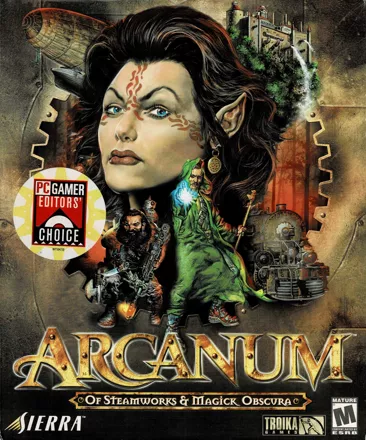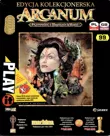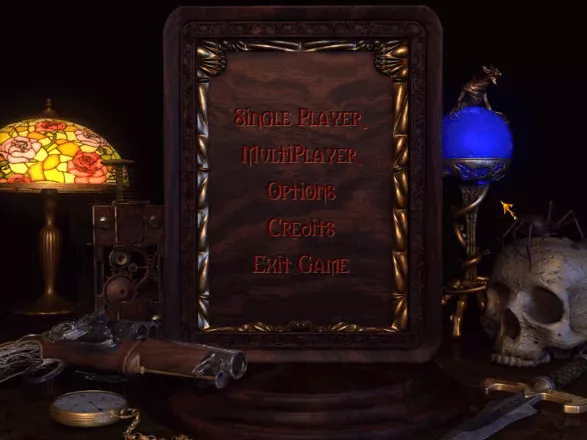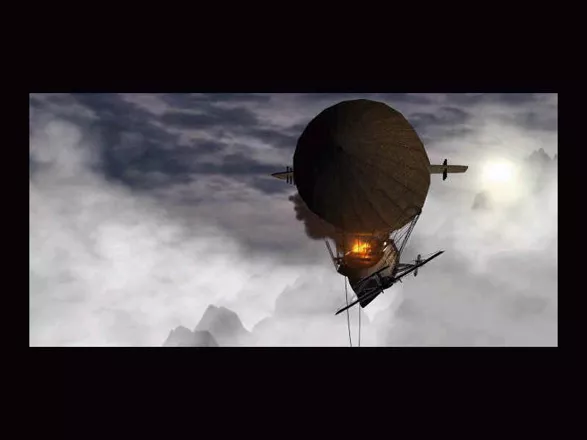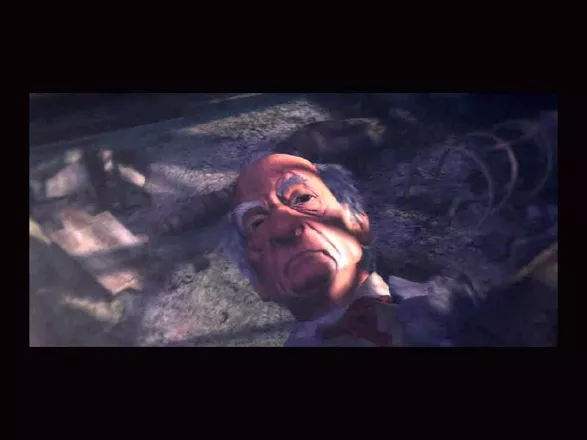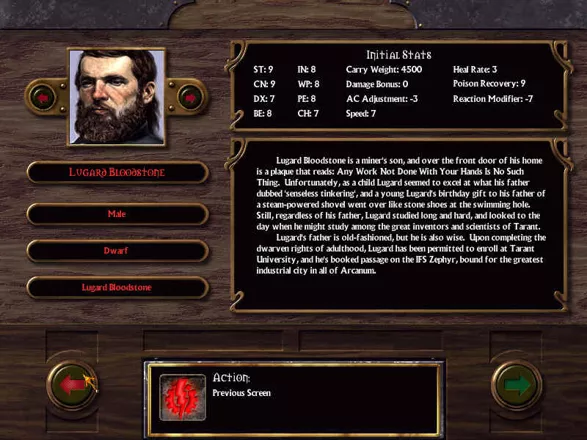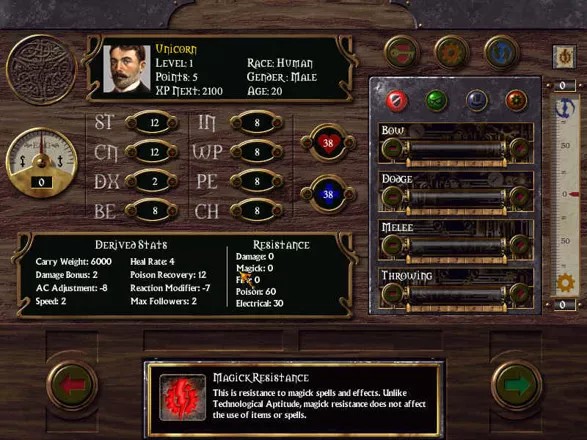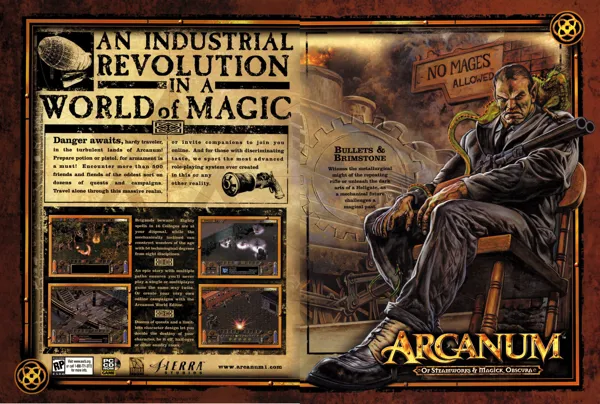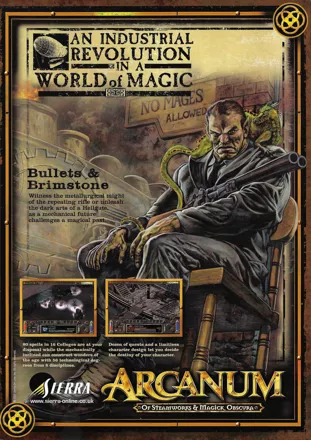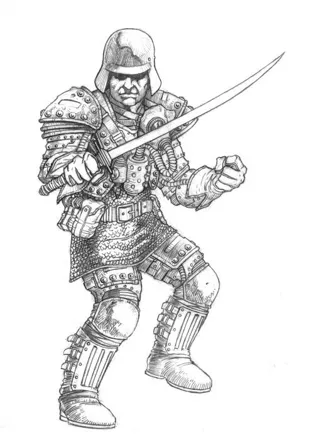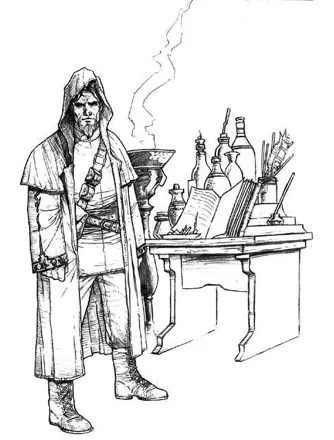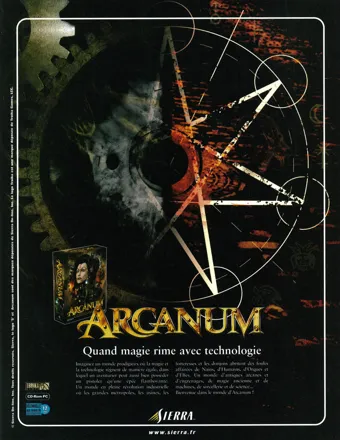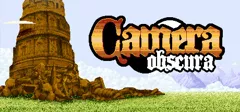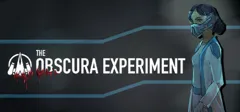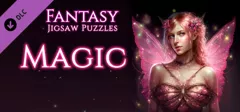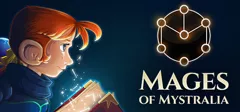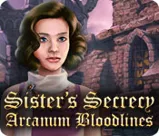Arcanum: Of Steamworks & Magick Obscura
Description official descriptions
The luxury zeppelin IFS Zephyr begins her maiden voyage from Caladon in the Kingdom of Arland to Tarant, one of the largest cities in the technologically advanced Unified Kingdom. Suddenly, while the zeppelin is cruising over mountains, two monoplanes attack it and eventually shoot it down. The two half-ogre attackers die in flames along with all their victims except two who miraculously survived. However, one of them, an old gnome, is mortally wounded. Just before he dies, he gives a silver ring to the other survivor and tells him to "find the boy". The witness of the crash, a man named Virgil, declares that the now only survivor is "The Living One", a reincarnation of a deity, and offers to follow him wherever he goes. The hero begins a long and perilous search for the mysterious boy, the origins of the silver ring, and the unknown enemy who was behind the attack on the zeppelin.
Arcanum is a role-playing game similar in concept and many gameplay principles to Fallout. It is set in a unique world, which can be described as mixture between Tolkienesque fantasy, steampunk technology and elements of British and North American culture of the 19th century: dwarves may carry molotov cocktails, and a half-orc protagonist can travel by train between Victorian-like cities. Magic and technology are opposed to each other; most humans and dwarves embrace technology, while some elf clans stick to the old ways and consider scientific progress evil.
In the beginning of the game the player creates the main character, choosing from a variety of races, attributes, magical or technological disciplines, social skills, backgrounds, etc. When the character levels up, the player can increase his main parameters as well as any available skills. Like in Fallout games, the player directly controls only one character; however, companions who join the party may be given orders, and their inventory can be managed by the player.
The game is open-ended: the player is free to explore the vast world from the onset, undertaking a large amount of side quests or following the main story. Social interaction plays a significant role: depending on the player character's charisma and intelligence attributes, as well as persuasion skill, many problems can be solved in a non-violent way. The amount of companions willing to follow the protagonist also depends on the latter's charisma rating; companions may also leave the party if they disagree with the hero's behavior.
The player can select one of the three combat modes for the game: real-time, turn-based, and fast-paced turn-based. Turn-based mode is similar to the combat in Fallout games: characters require action points to move, attack, or cast spells.
The game includes an editor called WorldEdit, which allows players to create their own maps, campaigns, and non-playable characters. Objects from the base game can be carried across to the player-created scenario. The scenery editor allows players to create their own objects. It is also possible to set and change game variables, i.e. the amount of skill points required to perform a specific task.
Spellings
- 奥秘:技术与魔法 - Chinese spelling (simplified)
Groups +
- BestSeller Series (Cendant / Havas / Vivendi Universal) releases
- Fantasy creatures: Dwarves
- Fantasy creatures: Elves
- Fantasy creatures: Gnomes
- Fantasy creatures: Halflings / Hobbits
- Fantasy creatures: Orcs
- Gameplay feature: Alchemy
- Gameplay feature: Brothels
- Gameplay feature: Character development - Skill distribution
- Gameplay feature: Gambling
- Gameplay feature: Karma meter
- Gameplay feature: Multiple endings
- Middleware: Bink Video
- Physical Bonus Content: World Map
- Protagonist: Female (option)
- Sound engine: AIL/Miles Sound System
Screenshots
Promos
Videos
Add Trailer or Gameplay Video +1 point
See any errors or missing info for this game?
You can submit a correction, contribute trivia, add to a game group, add a related site or alternate title.
Credits (Windows version)
157 People (118 developers, 39 thanks) · View all
| Project Leader | |
| Lead Programming | |
| Programming | |
| Design | |
| Animation | |
| [ full credits ] | |
Reviews
Critics
Average score: 79% (based on 61 ratings)
Players
Average score: 4.0 out of 5 (based on 168 ratings with 13 reviews)
The Good
This review is long. I apologize; I didn’t intend to waffle. If you decide not to read this because of its length, I perfectly understand you, and probably would immediately join you for a beer. But for the sake of my favourite genre, role-playing games, I have to explain in detail the errors of Arcanum. Because they are legion, and because they are fundamental. And now that you’ve made it this far, you could actually go on and read the whole text.
The Bad
Know this then: Troika Games consists of the people who created Fallout. Fallout was, and is, one of the most perfect role-playing games ever designed.
It is important to know these two things to understand the scope of Arcanum’s failure. Because everything that Fallout did right, Arcanum does wrong. On the plane of consciousness on which the game was created, which is certainly not our own, this might even be some sort of achievement.
Arcanum is not a bad game. In a certain respect, I wish it were; you can feel pity for the cripple, but a bore moves no one. As it is, it is hard to understand how Troika could have the cheek to publish a game that is so obviously outdated without making absolutely, perfectly certain that there is a healthy body under the rags. Instead, the garb covers a slip of a game dragging itself along.
Enough grumbling already. Let’s hear the facts.
I will never tire of stressing the brilliance of the Fallout skill system; in my book, it can hardly be improved. Arcanum exemplifies this point nicely, as they tried. To be fair, Arcanum’s skill system is still its strongest point; the specialization works reasonably well (although the game not nearly enforces it well enough), and the tinkering with technology is great fun. However, Troika confused quantity for quality and bred confusion. The problem is really simple: you have so many choices that you cannot decide on one. This might be called freedom, if it wasn’t for the game’s lack of guidance. You can only guess which skills might be useful; in fact, many aren’t at all. Any master gamblers out there? More: Why is there one point for all talents? Fallout showed how a wise structuring of skill areas can greatly improve comprehensibility. Why must the basic skills be changeable? That makes your character a wobbly turncoat instead of a clearly defined specialist. Why do Arcanum characters level up so frequently? This greatly diminishes the overall importance of levelling. If you play Arcanum and understand why freedom is not always a boon, the game may have a purpose after all.
Arcanum is the Might & Magic of 2D role-playing games: lots of insignificant quests, almost insulting in their stupidity, piling up like trash along the main road. I have nothing against a variety of challenges, but I demand exactly that: variety and challenge. At best, I hope for side-quests that arise naturally out of the game world and are motivated through the plot. Look at Baldur’s Gate 2, for example, where the desperate need for ransom money forces you to do menial tasks, or where you are – brilliant idea! – unexpectedly offered quests that concern one of your party members. Disappointingly few of Arcanum’s quests are sensible in this way, even less are remotely interesting.
Even worse, this is also true for the dungeon mission, regardless whether they are plot elements or not. Sad highlight is the Tarant sewer, an endless maze of blue-grey tunnels in which the designers threw in monsters at random, but forgot to throw in some sense as well. Even the randomly created dungeons of Diablo are more varied (and a lot more thrilling) than the hand-made corridor deserts of Arcanum. Pinch me, maybe I’m ungrateful. Probably it’s asked too much that dungeons are exciting, and an extra dose of enemies always makes up for the lack of those other things, wosname… puzzles.
You might not have noticed, but you have companions. Yeah, the guys that join your group until the next fight, when they die. Party members can be a great utility to increase a game’s depth. Take a look at Baldur’s Gate 2 once again to see how gripping a cleverly designed party can be. But try and answer me this question: What good are the companions in Arcanum? Please, this is serious, think! My little brother has put it perfectly in one word: packhorses. They carry around extra stuff. That’s all. And that’s sad. Generally spoken, companions could, and should, serve two purposes: contribute useful additional abilities to broaden the choice of actions, and enrich the atmosphere. The second job is more important and generally paid less attention. The Arcanum companions serve neither purpose, as their talents are of little value (Virgil has not opened one single lock successfully for me, Magnus can build utilities that I don’t need, and so on), and they follow you around speechless like zombies, when they could enhance the atmosphere so much by commenting on each situation, quest or person -- a huge chance wasted. If a game feature is useless, then it should either be improved or removed.
Oh, the fights. I cannot help but think that Troika would have preferred doing without. The battle system of Arcanum is, well, functional. It serves it purposes, i.e. killing evil guys. Sorry to insist, but I have another question: Why do you fight in Arcanum? I believe there is an answer to this question on a general level, but it doesn’t apply to Arcanum or to many other games. Somewhere along the line of RPG creation, the purpose of battles must have been lost. Fights should first and foremost be challenges. Tactical challenges. A good RPG fight is always a matter of superior intelligence against superior strength. Only then can a battle be thrilling and rewarding. It doesn’t matter whether the strategy is correct use of weapons, spells, formation, action points, timing, you name it; what matters is that you can use it, and that you can win by using it correctly. The Fallout fights were tactical in their use of action points, weapon choice and targeting system; no surprise that they were refined into a full-fledged strategy game (Fallout Tactics). In Arcanum, battles serve only the two lesser purposes: as obstacles and delays (a use which sooner or later exhausts the players’ patience), and as a means of acquiring experience points. Hey, think hard, was there a memorable fight in Arcanum? On second thought, don’t strain your memory.
If you played Arcanum, you probably know that there is a skill cap at level 50. I find the necessity for caps dubious on principle, but in Arcanum it is actually understandable: Your hero simply grows too strong too fast. This is only one of the effects of bad balancing. There are many more. Take the plot, for example. Actually, the story of Arcanum could be quite interesting. Unfortunately, it is stretched so thin over the first half of the game (up to the Isle) that it hardly moves at all. Especially in the beginning of the game, a fast pace is essential to wake and bind the player’s interest. In short: things need to happen. In Arcanum, things happen very, very slowly, and those that do are not really thrilling (“Oh, you found me! Now search that mine”). So, the plot would have needed tightening. Also, as a friend of mine pointed out very rightfully, the program does nothing to encourage a decision for either magic or technology. Again, don’t mistake that for freedom. A strong, early opposition of forces would not only create dramatic tension, it would also increase the replayablity a great deal -- after all, you’d like to see the other side, too. But again, a chance had, a chance thrown away.
Lastly, and most importantly, there is the issue of technology. Mind you, I can live with Arcanum’s graphics, even though I feel that sting when I look at the other games on the store shelf and the 40 bucks in my hand. But what I cannot live with is the game’s speed. In fact, to publish a game that looks like a mid-90’s relic and jerks like a slide show on a PIII is an unbelievable impudence. I don’t know what technical challenges the programmers faced, and I don’t care; I expect a working product for my money. If a TV salesman told me “Did I say constant viewing? Well, it shows static every few seconds, of course”, he’d see static for more than a few seconds. This technical botch-up is not only unnerving, it is also a genuine mood-killer; if the screen is drawn once a second, I can no longer enjoy the illusion to explore the exiting city of Tarant, but I am constantly reminded that I’m sitting at my desk and staring at a computer.
Thank you for your patience. If you were clever, you scrolled down directly to this paragraph in expectation of a summary. Here it is: Arcanum is a mediocre game in every respect, as it disregards basic guidelines that every game, especially role-playing games, should follow: pace and flow, guidance and soft pressure, depth without confusion, atmosphere and credibility, and especially, meaning. Meaning in a computer game? Not in the philosophical sense, not necessarily. But in a down-to-earth, every-day sense: telling the player what he has to do, and why. If there is meaning, what follows is motivation.
The Bottom Line
A huge disappointment for RPG fans, Arcanum tries to fly to the stars with a wooden rocket. Compared to Fallout, Arcanum is not one step, but a fair afternoon walk backwards. How on earth this could happen is beyond me; if anybody knows and is willing to tell, he could restore a distressed man’s sleep.
Windows · by -Chris (7762) · 2001
Troika is dead, Long Live Troika
The Good
As was with Fallout 1+2, the gameplay was, by and by, the main attraction of this game. The options for character development are massive; they put the majority of other games on the market to shame. The character creation is simple (and full of easy ways to waste your points if you haven't played the game before, or haven't consulted a guide), but as the game progresses, the player is given a massive range of options for character development. One of the nicer points about this game is that it is impossible to even come close to mastering more then a handful of the wide range of skills and abilities, it makes replays of the game a completely different experience.
Also worth noting is the great Steampunk setting, that is integral to the story, and also allows for a huge range of environments and characters for the player to explore and interact with. The background graphics add to the atmosphere; your characters explore everything from a industrial revolutionized town, to ancient elven cities in trees.
The story in this game is also well done, but often is ignored for long stretches of time in lieu of exploration and sidequests.
The Bad
The character graphics were abysmal for their time; the animation was jerky, the detail was low, and, in addition to that, the style was weak and generic feeling.
The battle system is good, but flawed. It is very close to Fallout's system, just not as well planned out and executed. There is also a "real-time" setting that is worthless except for the easy battles, as it moves far far faster then the player is able to command his character.
Also, even with it's final patch, the game still has terrible crashes and will occasionally eat a save game.
The Bottom Line
A brilliant RPG that needed just a little bit more polish to have achieved true classic status.
Windows · by aiolos (4) · 2006
Voi ch'entrate lasciate ogni speranza (Dante, but not the one met in Ashbury)
The Good
You WANT to play this game. It's Fallout garbed in Wild Wild West and
Dungeons and Dragons finery, with scents of Ultima VII. You want to play
until you have figured
the use of all those trinkets, filaments, metal shavings, sprockets,
watch mechanisms, and so on, and so on. Until you have built something
out of a broken flintlock pistol and a small tube (answer: a working
flintlock pistol). Until you have pieced together the fascinating
story of this engaging parallel world. Perhaps I have explored as much as
one hundredth of
the world of Arcanum, perhaps as little as a thousandth.
I want to see more, to explore it all.
Most likely, I never will. Why?
The Bad
It started gradually, my annoyance growing slowly, slowly. Little, tiny
wee pieces of aggravation which I was all too willing to put up with, so
eager I was to play on. Then it exploded like a soap bubble. Joachim's
trail of notes told us, Virgil and me, to go next to Stillwater.
Oh, we'd come across a mention of Ashbury too, but Stillwater seemed the
logical next stop. No Stillwater, no Ashbury on the World Map when
we consulted it, though. So we decided to board the train in
Tarant. As I went to buy tickets at the booth, my mouse pointer
turned into a sword. Wot? Combat mode? What had I done to deserve
that? I quit, reloaded, and was careful to watch my step this time. Combat
mode again?! Was it something I'd eaten? (too much garlic, maybe?).
After a few reloads, Virgil and I just decided to walk to Black Root
and board the train from there. All went well. So the Tarant incident
must have been a bug. But... wot? Stillwater was not on the time
table, but Ashbury was. So we rode to Ashbury, which then, and only
then, showed up on the map. We really had no interest at all in
fixing their problem with the ghouls, zombies, and assorted undead
in their cemetery, and Dante, who had eagerly joined us, seemed such
a shady necromancer type that we quit again, and reloaded. That is
when the bubble burst.
The bugs, the inept combat, the needle-in-a-haystack errands, everything.
The bugs. I just mentioned one. Another is during combat, when your followers, or the beasties, appear to go into an infinite loop, leaving you there, waiting for your turn, forever and beyond. And then, the odd screen freezing solid, but we're used to that.
The inept combat. The blurb on the game box is a farce. Don't you believe a word of it. The so-called turned-based combat allows you no tactics. In Fallout, like in X-COM Enemy Unknown, you know in advance the cost of moving here or there, and how many movement points you will have left for an attack. In Fallout, for every weapon you had, you knew the cost of using it, so many movement points for a shot of the sniper rifle, so many for the Desert Eagle pistol, so many for the sledgehammer, and so on. Nothing of the kind here. You just now how many movement points you have and the "speed" of your weapon, whatever that is. But you never know how many moves away you are from your target, how long it takes you to reload... why, as far as I could figure out, there was no reloading time, so that the only difference between a one-shot flintlock and a six-shot revolver was only damage and range. This is grotesque. Reloading a flintlock must have taken 30 seconds in real life. Shooting the next round of a single-action revolver? Cock the hammer, pull the trigger. A split second. Now all those things were nicely taken care of in Fallout. Here? Nothing. Combat has become a mindless brawl, a sorry farce. And I am cutting it short. I could rave on for two pages and more, count your blessings.
Next, the maps. Everytime you enter a town you can bring up a local map of it. The map is unrealistic and useless, because there is no "fog of war" so that the parts you have not explored are just as clear to see as those you have, and, typically, you never know whether you've already been here, or there, or if it remains to be explored. There is worse. If you have strolled along, oh, say, Devonshire Way in Tarant, and looked at the number plates of the houses there, they will show as question marks in the map, and, hovering your mouse pointer over them, the addresses will be revealed (good)... but not all places so observed will show with a queriable question mark (bad, very bad). Try that in Black Root especially. Some of the locations will have been recorded on the map, most not. This is particularly infuriating when, having found Sarah Boone in Dernholm, solved her problem in Tarant, and hoofed it back to Dernholm to tell her the good news... you have forgotten where she lived, and you have to visit every single godforsaken shack in godforsaken Dernholm to find her again (no-one you meet knows about her). Your journal is completely, utterly useless there. Why, you can't even jot down your own blog in it (remember Ultima Underworld?).
So Virgil and I resolved to download the two patches (5.4M in all), in the fond hope that they would make the game playable at last. We had learnt our lesson, too, namely, that if you take on many quests (errands, rather) you soon become lost. Er... yes... we got Colonel Eric von Stroheim's silver dentures from the Dark Elven Ruins, but where does he live again? With a great deal of luck your Journal has it: 36 Alexandrov Prospect. But in what city? Tough luck. You should have made a note of it on good old real paper with a good old modern real ballpoint pen. Imagine: all those technological gadgets in Arcanum, and they didn't even think of inventing the PIP Boy! Or at least, some proper paper and a proper goose quill, to keep with the Victorian England retro style.
So Virgil and I started all over again, from scratch, swearing never to take on a new quest until we had solved the current one.
And thus we came to the Mayor of Black Root, burdened as we were with the task of convincing him to pay his back taxes to the King of Cumbria in Dernholm. The mayor asked us to find his ceremonial dagger, his symbol of office, stolen by thieves "on the outskirts of town". We searched the outskirts of Black Root high and low, left, right and centre, east, west, south and north, to no avail. We interrogated every single living soul in Black Root. Not a clue. We downloaded a walkthrough, which said: follow the path leading out west of town, eventually you will find the thieves' camp. We did follow the path, and beyond, when the path petered out. Nothing. We trekked back and forth, forth and back, south and north, north and south, west of Black Root. In vain. And no wonder, a screenful covers an area of about 20 metres by 30, and after trudging 20 screens worth at least, you still find yourselves only a pixel away from your point of departure on the world map. We switched to the world map view, picked a point a longish way due west of Black Root, clicked "Go". Never a whiff of a thieves' camp.
Navigating the local maps is an infuriating business. Want to go from Madame Tussaude's to Delores Boston's place to deliver a crystal ball? Theoretically, you scroll the map, mark way points by clicking, then click the "Go" button and there you... go. First, why do you need intermediate points? Why can't you just click on your destination and be done with it? Second, you often get this hair-tearing message: "your path is blocked" when, in fact, the two points are within plain view of each other, without a single obstacle in between. Third, sometimes, you just don't make it there because a wandering pedestrian has chanced into your path, and the AI is too stupid to have you walk around him. You have to take over and do it yourself.
A similar "path blocked" message often flashes on the world map when trekking from one city to another, even though there is nothing in the way of your destination. You just have to find another way point, not "blocked", a few pixels away.
And the world map is bogus. I talked Virgil into taking a break on our way to Black Root to take a look at the bridge over the river (what's its name? No names for those rivers on the world map). I was expecting a breath-taking view of a feat of Victorian engineering. I clicked on a point carefully picked slap bang in the middle of the picture of the bridge... go! When we got there, lo and behold... no bridge, no river. Just grass. We went in ever widening circles looking for the bridge. We didn't even find the river. But just try clicking your first way point on the west side of that non-existent river, the second on its east side... "path blocked". To get through, your two way points must straddle the bridge exactly. Ridiculous.
The Bottom Line
1. Combat is a brainless, preposterous farce. Don't put up
with it: find a character editor and pump up your and
your followers' strength and dexterity right up to the
maximum.
-
Don't rely on your "journal", keep your own, either on physical paper using a physical pen, or repeatedly hitting Alt-Tab to access your favourite word processor (mine is NoteTab).
-
Be prepared to be frustrated.
Windows · by Jacques Guy (52) · 2004
Discussion
| Subject | By | Date |
|---|---|---|
| [false alarm] glitch: no speech? | Rola (8483) | Oct 20, 2018 |
Trivia
Graveyards
A hidden graveyard, containing tombstones of Arcanum's most diehard fans, can be found at the location W: 1060 S : 809 on the world map. Another graveyard has lots of humorous epitaphs written on the graves. However, many of them are taken directly from Baldur's Gate.
Manual
Following on the tradition started in the Fallout manuals, Arcanum's manual includes an actual cooking recipe. This time it's Grandma Cookhill's Three Bowl Bread.
Mod pack
On 7 January 2002, the development team released a free mod pack, containing six new and exclusive adventures. It can be downloaded here.
Mods
Chris Beddoes has produced a mod for this game that addresses some balance issues, makes it overall a little more challenging, and replaces the entire opening area and quests. This latter is important because the opening area was used in the demo, and many players have just seen it too many times to want to start a new character any more, despite the near-infinite possibilities for character design. It can be found here.
References
- There's a location in the game called the "Isle of Despair" which is a penal colony which holds it's inmates in a remote island behind a magical barrier that makes it impossible to escape. Now, when asking the generic NPCs for its location, they answer:
"You mean the Black Isle? I'm not quite sure..."
Black Isle Studios is the name of Interplay's RPG division, and the former home of Arcanum's development team.
- A portion of the Stillwater giant quest contains a major (and fairly obvious) reference to Monty Python and the Holy Grail, specifically the part where you have to trace the beast to a cave and capture it. In fact, the whole sequence plays just like in the movie, you follow some giant footprints, enter a dark cave filled with bones and dead bodies, and so on.
- There's a Fallout reference in the walled city of Tulla. Apparently one of the students had to venture out in the Wastes to find a Water Gem. He has since returned and the Mages fear how the journey changed him and the influence he might have on other students. Plus, he's wearing mechanized armor.
- There's actually a reference to Bill Gates and Microsoft stealing the ideas for their Windows operating system from Apple's MacOS. One of the most influential and wealthy of people in Tarant is Gilbert Bates (Swap the G and B in Gill Bates and you have Bill Gates) because he brought the power of the steam engine to mankind. Another steam engine developer, called Cedric APPLEby is spiteful of Bates's success and claims that he invented the steam engine first and that Bates had stolen the idea off him.
Server shutdown
The official online servers were shut down on 1 November 2008.
Soundtrack
The soundtrack to Arcanum was composed by Ben Houge for string quartet and was provided in its entirety on Computer Gaming World's May 2001 demo CD.
Both the soundtrack and its sheet music are available as a free download.
Stillwater giant
Despite the result of the associated quest, the Stillwater giant DOES exist. It can be found on a random encounter between Stillwater and the pass to the elven city.
Information also contributed by Rambutaan, Sciere, Terrence Bosky, uclafalcon, Unicorn Lynx, weregamer, Wojit and Zovni
Analytics
Upgrade to MobyPro to view research rankings!
Related Sites +
-
Arcanum Walkthrough by Quandary
by Steve Metzler -
Developer's Site
Troika's Arcanum page -
Hints for Arcanum
Having trouble with Arcanum? These hints are arranged in question and answer form to help you solve it on your own. Includes complete solutions. -
Mike's Arcanum Resources
A really good Arcanum fan site with many things you can't find elsewhere. -
Official Arcanum Website
The Official Sierra: Arcanum Website (English) -
Official website (german)
Official website (german) -
Sierra: Arcanum - Soundtracks
The Arcanum soundtrack is officially available for download here! -
Terra Arcanum
Wonderful fansite with walkthrough and good gameplay hints.
Identifiers +
Contribute
Are you familiar with this game? Help document and preserve this entry in video game history! If your contribution is approved, you will earn points and be credited as a contributor.
Contributors to this Entry
Game added by Unicorn Lynx.
Additional contributors: Zovni, Kaliban, Indra was here, Jeanne, phlux, JRK, tbuteler, jsbrigo, Alaedrain, Patrick Bregger, Plok.
Game added August 25, 2001. Last modified April 5, 2024.
